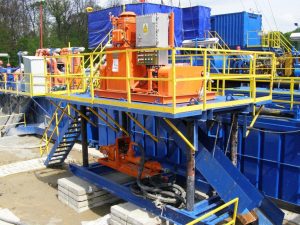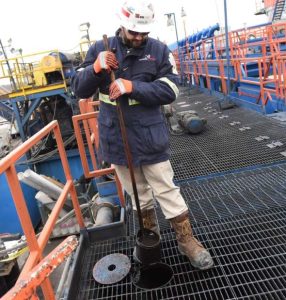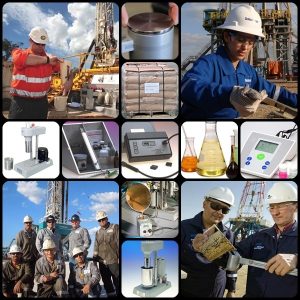What is Mud Engineering ?
What Is the Job of a Mud Engineer?
As a mud engineer, also known as a drilling fluids engineer or mud man, you manage the drilling fluid used in the digging of oil wells. This involves making adjustments to the liquid being used, supervising the equipment on a rig, and helping test for oil and gas. This position offers a significant amount of control over the specifications of a drilling plan, in part because the fluid mixture must be customized to create the most effective drilling path through the unique terrain of the area. Since your presence is required during the drilling process, mud engineers spend almost all of their time on-site.
A person responsible for testing the mud at a rig and for prescribing mud treatments to maintain mud weight, properties and chemistry within recommended limits. The mud engineer works closely with the rig supervisor to disseminate information about mud properties and expected treatments and any changes that might be needed. The mud engineer also works closely with the rig’s derrickman, who is charged with making scheduled additions to the mud during his work period.
Mud engineers, also known as Drilling fluid engineers, are responsible for mixing, controlling and testing drilling fluids, also known as ‘mud’, which is used in the process of drilling. They typically work with other engineers and geologists on oil and gas rigs and are well versed in drilling practices.

What is Mud?
Mud is an integral part of drilling operations. It provides hydrostatic pressure on the borehole wall to prevent uncontrolled production of reservoir fluids. It also lubricates and cools the drill bit, carries the drill cuttings to the surface and forms a “filter cake” on the borehole wall to prevent the entry of drilling fluid.
To perform all of these tasks effectively, the mud contains carefully selected additives that are added by the mud engineer to control its chemical and rheological properties.
Drilling mud is typically a shear-thinning fluid with variable viscosity. Bentonite is commonly used as an additive to control and maintain the viscosity of mud and also has the added benefit of forming a filter cake.
In addition, barite is commonly used to “weigh down” the mud in order to maintain sufficient hydrostatic pressure in the borehole. This is of vital importance in a drilling operation to avoid being kicked and ultimately blown out by uncontrolled production of formation fluids.
The surface “mud pits” are carefully monitored as an increase in mud level indicates a kick is occurring and may require the wellbore to be closed and heavier drilling mud circulated to prevent further formation of formation fluid or gas.
Responsibilities of a Mud Engineer
The primary role of a mud engineer is to create various combinations of draining fluids to be used throughout the drilling process. They thoroughly investigate the soil and after obtaining the geotechnical information from geologists, create and recommend draining fluids.
They are required to recommend drill bits and assist technicians during the digging process as well as work with the project manager in charge to ensure swift delivery of materials in order to meet deadlines and speed up the drilling process.
Mud engineers are in charge of testing during the entire drilling process in order to monitor and detect any potential problems and change the viscosity, temperature, chemical components and pH balance of the mud as needed. They also often work with drilling technicians and engineers to determine the costs associated with the drilling process.
Mud engineers are also responsible for minimizing waste and thereby reducing the cost of disposal by measuring out the right amount of mud needed at all stages of the drilling process.
Tasks and responsibilities of a Mud Engineer:
- Create various combinations of draining fluids to be used throughout the drilling process
- Investigate soil before drilling
- Obtain geotechnical information from geologists before drilling
- Recommend draining fluids to be used at every stage
- Recommend drill bits
- Assist technicians during the drilling process
- Work with project manager in charge to ensure swift delivery of materials
- Conduct testing in order to monitor and detect any potential problems with the mud
- Work with drilling technicians and engineers to determine costs associated with the drilling process
- Minimize waste associated with draining fluids
- Measure out the right amount of mud needed at all stages
Skills Required
The most crucial skill for mud engineers to have is expert knowledge in drilling fluids, fluid systems and drilling bits. They must have the ability to create detailed mud logs and must have technical knowledge in the areas of geology, mathematics, physics and chemistry.
Expert knowledge in the different additives, drilling contaminants and the treatment of mud is of extreme importance, as is knowledge of the different types of equipment used at a rig. A mud engineer must also have knowledge in safety protocols and environmental regulations.
A mud engineer must have knowledge of waste management and extraction techniques and must be able to efficiently determine the costs of drilling and extraction. IT skills are also an important part of being a mud engineer.
Since mud engineers work on rigs with other personnel, strong communication, interpretational and cooperation skills are crucial. They must also be able to think analytically, work well under pressure and develop solutions to any problems that may arise.
Skills of a Mud Engineer:
- Expert knowledge in drilling fluids, fluid systems and drilling bits
- Ability to create detailed mud logs
- Technical knowledge in geology, mathematics, physics and chemistry
- Knowledge of different additives, drilling contaminants and treatment of mud
- Knowledge of different types of equipment
- Expert knowledge in safety protocols and environmental regulations
- Proficient knowledge in waste management
- Knowledge in extraction techniques
- Efficiency in determining costs of drilling and extraction
- Strong IT skills
- Strong communication skills
- Interpretational and cooperation skills
- Ability to think analytically
- Ability to work well under pressure
- Develop solutions to any potential problems
Background
Getting a Bachelor’s degree in Engineering is often the first step you can take to become a mud engineer. The role is certainly open to all engineering backgrounds but certain engineering degrees, such as Chemical, Minerals or Mining, may be favored more by employers.
Many mud engineers begin their careers in manual work positions, such as drilling assistants, on oil or natural gas rigs.
Mud engineers often earn their position through on-the-job training combined with years of experience. Vocational and professional training in mud technology is offered by “mud schools” and some engineering schools offer specific training on drilling fluid technologies.







